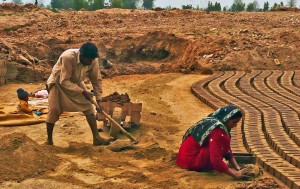“The Church is growing.” You’ve heard that said about any area where persecution is prevalent.
It’s true in Pakistan, as well, where the oppression against Christians is reaching a crisis. It’s such an issue, it seems, that the Pakistani government is cracking down on slums in Islamabad over concerns the Christian population could overtake the Muslim majority.
Bruce Allen of Forgotten Missionaries International says the Capital Development Authority (CDA) made its decision last year about the slums in and around the capital. ”In Islamabad, there [are] about 80,000 Christians in these different settlements. There have been groups calling for the eviction of these Christians.” Most people living in these areas are Christians and Afghan refugees. Allen then explains the reason they’re in the slums. “81% of Christians across Pakistan do not own their own homes…four out of five Christians. Those people, the 81%, either have to rent from landlords or else they’re kind of relegated to Christian slums or ghettos.”
Displacing 80,000 or more people with nowhere to go seems heartless. Yet, Allen confirmed the report through Brother Nehemiah, FMI’s Pakistan director. In response to the question, he wrote, “[SIC] As per military action plan, all illegal unauthorized colonies will be demolished with 30-days notification. This action was taken due to highly-populated Afghan colonies as number of high value targets arrested from these colonies. This Christian colony is also illegal and allotted to local Christian people in years ago by [a] member of national assembly to get votes in Pervaiz Musharraf’s regime [the previous administration]. Worst part of this situation is that government is not showing any interest to give some alternative place [for] people [to] stay temporary/permanent.”
The CDA tried to justify the decision. “They were generating the propaganda that these settlements were harboring Islamic terrorists.” Instead, a report offered this profile of the slum areas. “Two-thirds of the Christian families are living below the poverty line in Pakistan,” says Allen. These Christians are trapped in the cycle of poverty because most can’t afford an education. Without an education, they’re relegated to a 3D job (dangerous, dirty, and difficult). “They may be part of a church,” Allen notes, “[but] they can’t support their pastor to stay in ministry.”

A young married couple teams together to mix clay and slap it into a metal form. Their baby joins them during their workday in the “giant sandbox.”
(Photo, caption cred: FMI)
(Photo, caption cred: FMI)
It’s here that FMI comes alongside the indigenous churches either through training, tools, or pastor support. Allen says if the eviction orders go through, a massive humanitarian effort is in the offing. FMI tells these church leaders, “We will partner with you for a number of years to help you lead your congregation to maturity. We don’t want you to leave ministry.’”
However, the U.S. Commission for International Religious Freedom noted in this year’s report that Pakistan represented “one of the worst situations in the world for religious freedom” and again recommended that the administration designate it a “country of particular concern.”
Given the challenges Gospel workers face, Allen says, “Pray for God’s good provision for His children. Pray for the wisdom of the pastors who serve the congregations that are made up of those folks that they would have courageous and creative leadership.” As for what’s needed to help church leaders, You have promised that when Your children ask for bread, You do not throw stones at them. You give them what they need.’”
https://www.mnnonline.org/news/target-christian-populated-slums-in-pakistan/

No comments:
Post a Comment